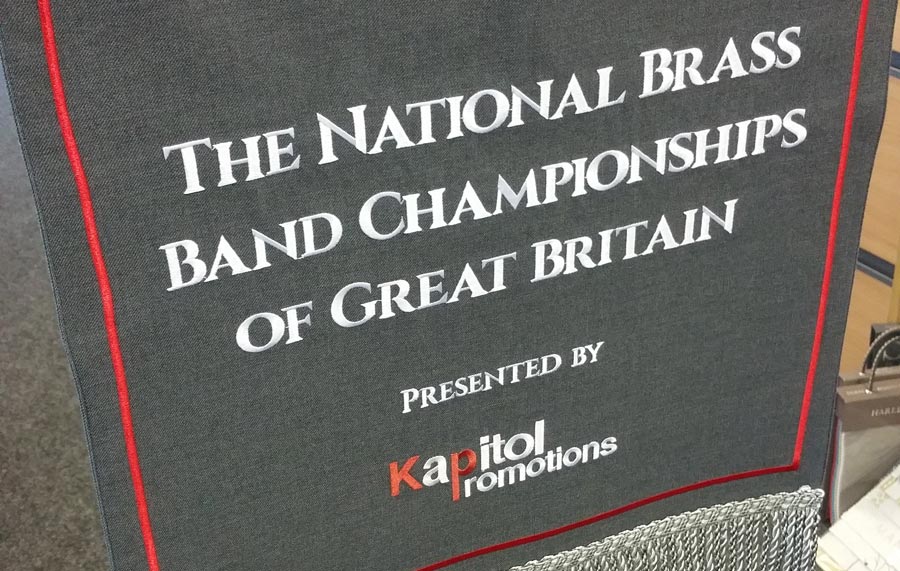
The National Finals return this weekend – diminished in competitive numbers but hopefully not in stature.
For the bands seeking to claim one of the four section titles on offer, the last few weeks would have been a mixture of upbeat enthusiasm and hard work tempered by a large dose of pessimistic realism.
Few would argue that the Cheltenham event marks a return to pre-Covid-19 contesting ‘normality’ – although just what that was is open to debate – but it does signal the first small step on a what is likely to be a hazardous path towards future long-term sustainability.
18 months or so have passed since bands were ‘invited’ to take part following the 2020 Area contests (London & Southern Counties understandably not withstanding).
Root and branch reform
Nobody could have predicted the length of the hiatus that followed, although it soon became apparent that the time wasn’t going to be used to look at root and branch reform of the competition as a whole.
Few would argue that the Cheltenham event marks a return to pre-Covid-19 contesting ‘normality’ – although just what that was is open to debate – but it does signal the first small step on a what is likely to be a hazardous path towards future long-term sustainability.
From grading structures to the number of qualifying bands, these were already red-list problems long before Covid-19 arrived at rehearsal room doors.
Not alone
The Nationals are not alone in that of course – not by any means. But Kapitol’s flagship series of competitions is the most visible symbol, as well as the barometer of the health of the UK wide banding movement.
Every event – from national youth championships to local association contests knows that the post-Covid era will need to be embraced in a very different way if they are to survive let alone prosper.
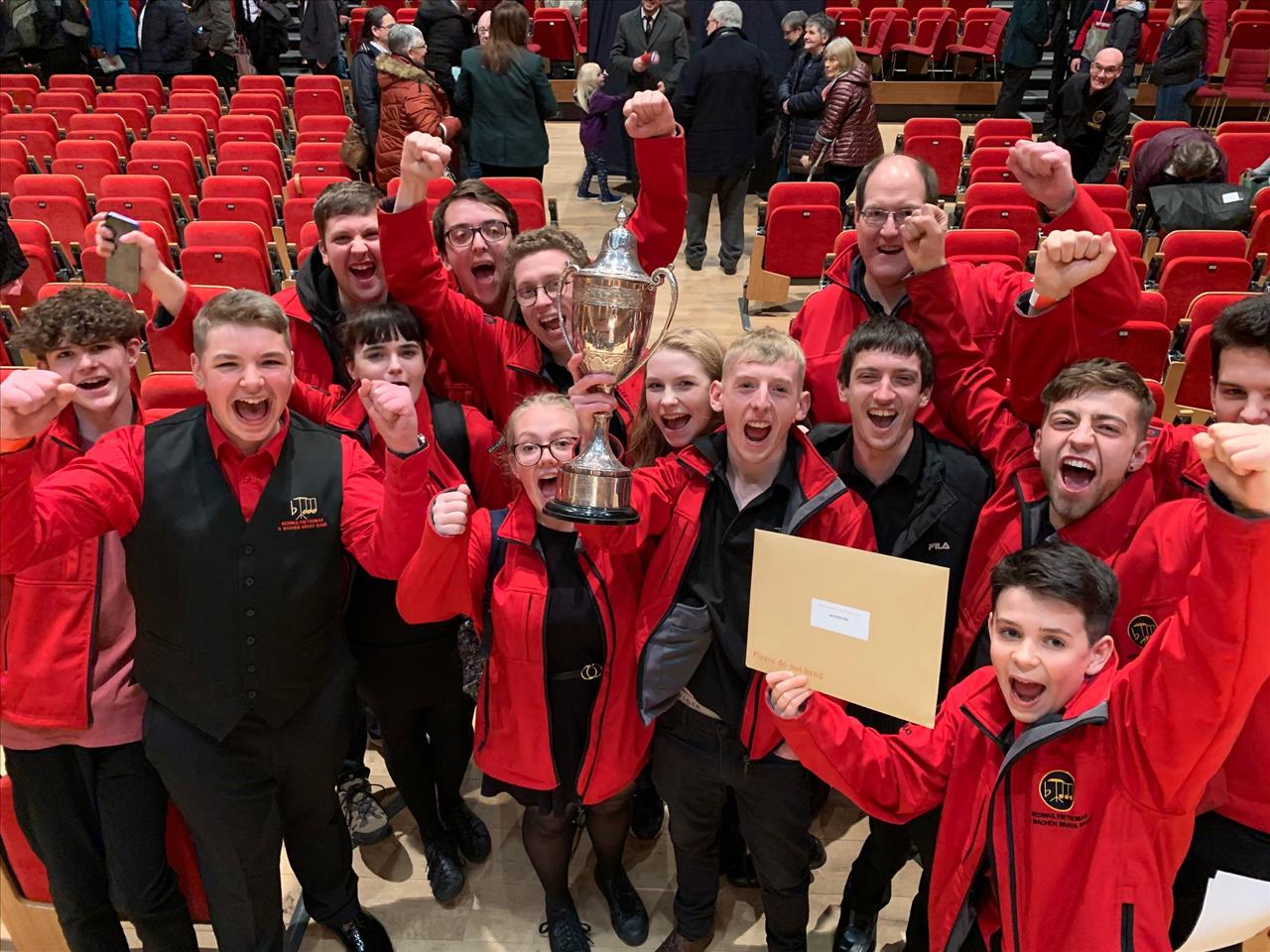
The 2020 Welsh champion BTM players will all be at least 1 year older...
Evidence
However, it is this competition (and London) alongside the 2022 series of regional contests that follow early next year that could provide the overwhelming evidence to trigger a process for realistic, long-term change – one that if undertaken with honesty, forthrightness and cooperation may signal a new era of banding security.
Whether or not we are all prepared to work together now that we could face yet more anaemic strength entry lists is a question that currently remains unanswered.
Kapitol Promotions knows it, Brass Bands England, the Scottish Brass Band Association and Brass Bands Wales know it too. So does every regional committee, contest organiser, band, conductor, player, adjudicator and media journalist alike.
Whether or not we are all prepared to work together, now that we could face yet more anaemic strength entry lists, is a question that currently remains unanswered.
Willing to listen
Kapitol has its critics but is willing to listen. And whilst social media opinions are plentiful, perhaps it isn’t surprising to know that they haven’t exactly been inundated with an e-mail post bag full of detailed proposals to come up with a realistic alternative to the current status quo.
In that respect the stature of the National Championships remains core to any future blueprint - even if in the years to come it may well feature fewer bands.
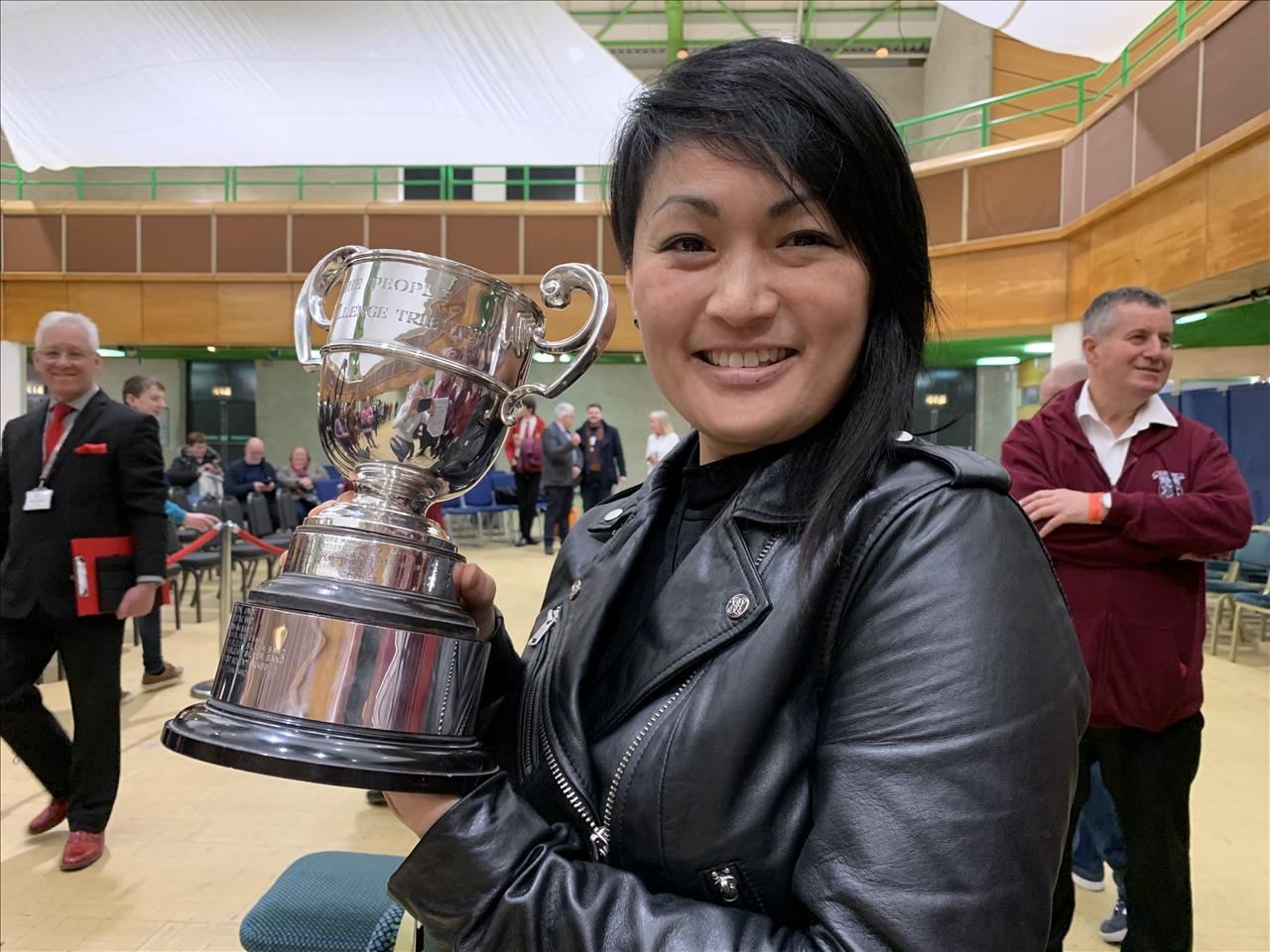
Nailsworth MD Anri Adachi will be leading her band in the Fourth Section
Quality not quantity?
Having a National Final at London and Cheltenham (or wherever) that is smaller, but better in terms of condensed quality though is surely not all together a bad thing?
One thing is for certain though.
Leaving things the way they have been for the past 20 years or so since the formation of the First Section can no longer paper over the cracks. By this time next year those cracks may well have become crevices.
Leaving things the way they have been for the past 20 years or so since the formation of the First Section can no longer paper over the cracks. By this time next year those cracks may well have become crevices.
Look forward
Let’s hope whoever wins on the weekend won’t in years to come be seen as some of the last of their kind – an interesting if irrelevant entry in a dusty record book. Instead, they could become the standard bearers of a new era of competitive excellence.
Plenty still to look forward to this weekend – especially from all the bands that have made it here.
One difference from 4BR this time as well.
Given the time every band has spent away from the regular discipline of weekly rehearsals, it would be unfair to make predictions on this occasion – so good luck to everyone who is taking part.
First Section:
Test Piece: Connotations (Edward Gregson)
Adjudicators: Alan Morrison; Steve Sykes; Sheona Wade
Saturday 18th September
Start: 3.45pm (approx)
Blackburn & Darwen (Daniel Thomas) — North West
Brunel Brass (Daniel Hall) — West of England
BTM (Jeff Hutcherson) — Wales
Jackfield (David Maplestone) — Midlands
Kingdom Brass (Ian Porthouse) — Scotland
Knottingley Silver (Kevin Belcher) — Yorkshire
Medway (Nigel Taken) — London & Southern Counties
Newstead (Jim Davies) — Midlands
Ripon City (Mark Sidwell) — North of England
Roberts Bakery (Paul Lovatt-Cooper) — North West
Sandhurst Silver (David Johnson) — London & Southern Counties
Tylorstown (Gary Davies) — Wales
Unite the Union (John Davis) — Yorkshire
York Railway Institute (David Lancaster) — North of England
Edward Gregson’s iconic composition will present a stern test of musical character for the 14 bands on Saturday afternoon.
Written in 1976, ‘Connotations’ remains as fresh and engaging today as it was when it was heard for the first time at the 1977 National Championship of Great Britain.
It has lost none of its stature by being heard in Cheltenham rather than the Royal Albert Hall.

The man who wrote the iconic work - Edward Gregson
Each of the judges, Alan Morrison, Steve Sykes and Sheona Wade also have substantial experience of performing it as players and/or conductors, so the clarity of the writing won’t be hidden by bluff artifice or dynamic camouflage if a band is to make a persuasive case for title honours.
Written in 1976, ‘Connotations’ remains as fresh and engaging today as it was when it was heard for the first time at the 1977 National Championship of Great Britain.
And looking at the list of MDs at the helm of the contenders, the majority should also have encountered it in playing or conducting capacities before.
Informed insight
So whilst Edward Gregson said that the title, “suggests more than one way of looking at something, an idea, and this is exactly what the piece is about”, their experience should hopefully mean that they won’t opt for bludgeoning the senses with vacuous interpretations of crass dynamic bluntness, but by performances borne of informed stylistic insight.
Paul Hindmarsh has written a very cogent appraisal of the structure of the work (one published on the Kapitol Promotions Ltd website), whilst in the last issue of Brass Band World magazine, Alan Morrison also gave an enlightening overview, with hints of what he and his fellow judges would perhaps be looking out for.
Each is based on the ambiguous interval of a fourth; a delicate toccata followed by a robust, driven exploration; a lyrical interlude segueing into a dislocated scherzo before a series of cadenzas bridge to a wonderfully crafted, dancing introduction, fugue and majestic apotheosis of the theme.
Cool heads
He talked about MDs having “a cool head” to “bring together and link each changing mood and variation” – nine in all with the first played as a form of fanfare introduction before the theme itself.
Thereafter we move through thematic and stylistic transitions.
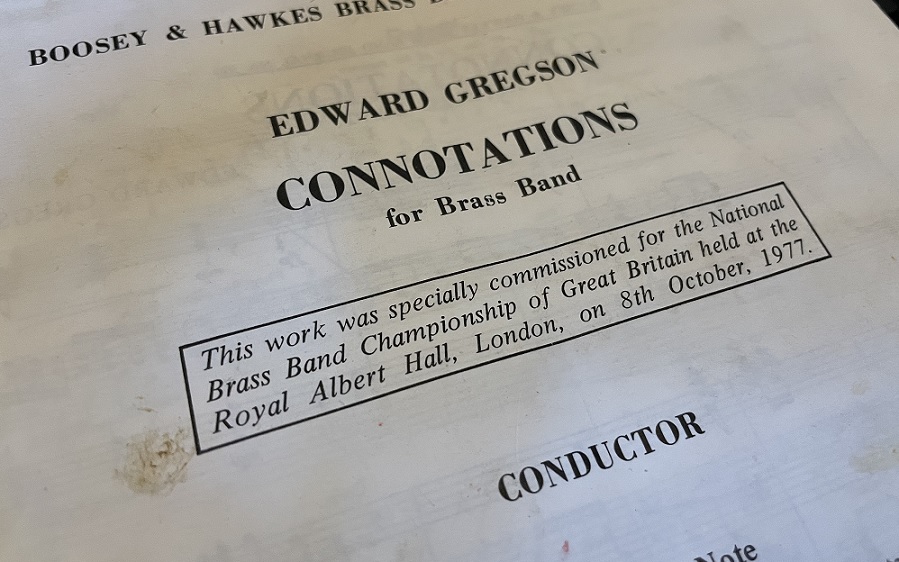
Age certainly has not made it sound old...
Each is based on the ambiguous interval of a fourth; a delicate toccata followed by a robust, driven exploration; a lyrical interlude segueing into a dislocated scherzo before a series of cadenzas bridge to a wonderfully crafted, dancing introduction, fugue and majestic apotheosis of the theme.
Leitmotif
Elements of ‘Connotations’ provide the leitmotif of other Gregsoin works (there is a lovely nod of appreciation in his latest ‘World Rejoicing’), whilst there can’t have been a modern-day brass band composer who hasn’t pinched a few of his ideas for their own compositions – including the wonderful C major climb to the final chord.
By then any band’s claims on the First Section title will have been decided.
Second Section:
Test Piece: Lions of Legends (Thierry Deleruyelle)
Adjudicators: Nicholas Garman; Steve Pritchard-Jones; David Hirst
Sunday 19th September
Start: 2.45pm (approx)
Abertillery Town (Alun Williams) — Wales
Annan Town (Andrew Warriner) — Scotland
BD1 (Lee Skipsey) — Yorkshire
Bedford Town (Craig Paterson) — London & Southern Counties
Cockerton Prize Silver (Andrew Hunter) — North of England
Durham Miners' Association (Stuart Gray) — North of England
Eagley (Christopher Wormald) — North West
Glossop Old (David Ashworth) — Midlands
Gresley Colliery (Craig Stevens) — Midlands
Hatherleigh Silver (Nick West) — West of England
Hebden Bridge (TBC) — Yorkshire
St Keverne (Karl Long) — West of England
Taff Vale (Gareth Ritter) — Wales
Tendring (David Johnson) — London & Southern Counties
Uppermill (Mark Peacock) — North West
Valley (Haydock) (David Chadwick) — North West
Wantage Concert (Paul Holland) — London & Southern Counties
Forget the likes of Gareth Edwards and Barry John, Martin Johnson, Gavin Hastings and Brian O’Driscoll.
Thierry Deleruyelle’s ‘Lions of Legends’ composition is based on the metaphoric symbolism of the ‘Kings of the Jungle’ rather than the ‘Kings’ of the British & Irish Lions international rugby field.

The Lion King - composer Thierry Deleruyelle
A pity really, as the same elements of courage, strength and temperament which the Frenchman talks about in his test-piece introduction are also required when facing a rampaging All Blacks front row; studs likes claws ready to rip the jersey from your back at the bottom of ruck.
Hopefully no blood will be spilt in the pursuit of glory in Cheltenham on what is a thoroughly engaging work, drawn with an evocative pen.
Fraternal links
Interestingly ‘Lions of Legends’ was written in 2016, the same year as Deleruyelle’s ‘Fraternity’ created a huge impression at the European Championships.
And whilst it doesn’t have the inherent structural complexities in its five linked sections, or deeply moving sense of emotive distillation, the same trademark elements of colouring and texture, rhythmic drive, rich chords and bold lyrical confidence are on show.
In his extensive overview of the work in Brass Band World magazine, adjudicator David Hirst (who will be joined by Nicholas Garman and Steve Pritchard-Jones) pinpointed just how that colour and texture can only come to life with a keenly observed eye on the dynamics – the contrasts of which give the music its vibrancy and character.
And whilst it doesn’t have the inherent structural complexities in its five linked sections, or deeply moving sense of emotive distillation, the same trademark elements of colouring and texture, rhythmic drive, rich chords and bold lyrical confidence are on show.

This is a piece that shows both its teeth and claws...
Deleruyelle also knows how to perceptively write for percussion – integrating it into the tonal mix rather than simply sprinkling it on top to add distracting glitter and sparkle.
That means careful consideration will have to be given by MDs as the stage at Cheltenham can be an unforgiving place for ‘enthusiastic’ percussion.
Muscular power
The opening ‘King of the Animals’ has a predatory sense of muscular power, although ending with a relaxed horn cadenza, whilst the following ‘Claws and Roaring’ (without the lion’s roar audio sample?) is written to evoke a sense of social communication – from the guiro scratch of the claws to the menacing timpani growl, led by a demanding solo cornet line and baritone echo.
Occasionally it veers off into dislocated rhythmic patterns as it flees in panic, before finally being brought down for the pride to tuck into a juicy hind leg or two.
Tribal excitement
Meanwhile, ‘The Buffalo Hunt’ is a bit of tribal excitement – all visceral hot air (blown through instruments, much like ‘Fraternity’) and the sound of beating paws on hard savannah ground as the prey is stalked.
Occasionally it veers off into dislocated rhythmic patterns as it flees in panic, before finally being brought down for the pride to tuck into a juicy hind leg or two.
Refined majesty
A different symbolism of power is heard in ‘Emblems and Crests’, which has a slow flow of refined majesty.
It’s a bit like walking past a row of heraldic shields perched high on a wall at Windsor Castle – all middle band tonality topped by sweet sop and cornet, before we head outdoors for the power pussycat finale – and a reiteration of the opening thematic material and drive to the end.
Lots to enjoy, but a great deal to have worked on in a short space of time for the bands taking part here.
No doubt about it though – it’s a very difficult test given the circumstances, but a rewarding one that will surely have enthused players, conductors and the odd rugby player on their return.
Third Section:
Test Piece: Kaleidoscope: Five Variations on the ‘Brugg Song’ (Philip Sparke)
Adjudicators: Alan Bourne; Mark Wilkinson; Glyn Williams
Saturday 18th September
Start: 9.30am
Beaumaris (Clive Zwanswiniski) — Wales
Chichester City (Alfie Hughes) — London & Southern Counties
Gosport Solent (Rich Sharp) — West of England
Hazel Grove (Nigel Beasley) — North West
Kippax (Stephen Tighe) — Yorkshire
Langholm Town (Chris Shanks) — Scotland
Lofthouse 2000 (Lee Whitworth) — Yorkshire
Lostock Hall Memorial (Ryan Broad) — North West
Ocean Brass (Martin Humphries) — West of England
Olney (Phil Devine) — London & Southern Counties
Pilling Jubilee Silver (Steve Hartley) — North West
Poole Borough (Lloyd Bartlett) — West of England
Raunds Temperance (Jonathan Pippen) — Midlands
Stamford (Julian Bright) — Midlands
Tewit Silver (Martin Hall) — North of England
Usk (James Jones) — Wales
‘Kaleidoscope: Five Variations on the ‘Brugg Song’’ was commissioned by the Aargau and Waadtland Music Associations (Switzerland) as the test piece for the Aargau and Waadtland Cantonal Music Festivals held in 2003.
As composer Philip Sparke lays out in his introduction, it is a set of five variations on the ‘Brugger Lied’ (Brugg Song), which is the traditional song of the town which lies about halfway between Basel and Zurich.
Not of gnomes
The lyrics tell of its geography, population and traditions – a simple musical reflection of hard-working people with a strong sense of community.
This is a Switzerland not of the gnomish financial bean counters or international bureaucrats, but of shopkeepers and tradesmen, farmers, teachers and brass band players.
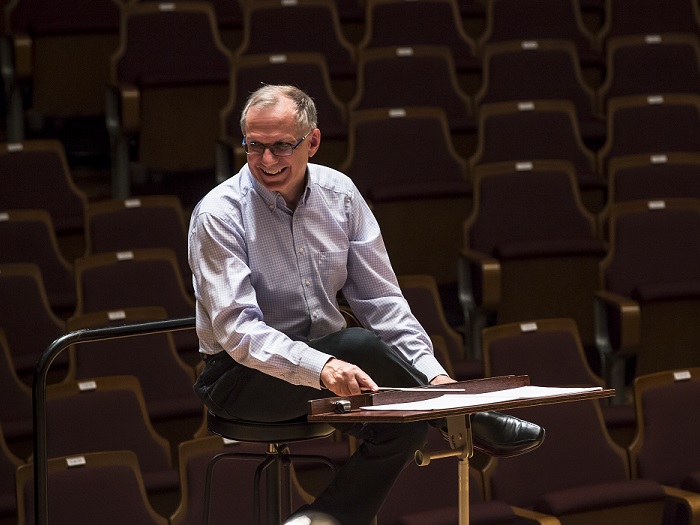
The Swiss mastercraftsman - a very English Philip Sparke
Nothing simplistic
However, there is nothing simplistic about the way Philip Sparke develops his ideas; not by variations of the tune itself, but on small fragments extracted from it.
This is a Switzerland not of the gnomish financial bean counters or international bureaucrats, but of shopkeepers and tradesmen, farmers, teachers and brass band players.
It’s as if he took a leisurely stroll through the town whistling the tune, popping into local shops in no specific order to sample the food and snatch a conversation with the proprietors along his way.
And that is what provides its essential ‘Kaleidoscopic’ nature: a constantly changing pattern of explorations derived from the simplest of sources (six in total from the song). The next day he may have taken a different route.
Deceptively easy
It sounds deceptively easy on the ear, but it takes a real craftsman to make it work – and Sparke is certainly that and more.
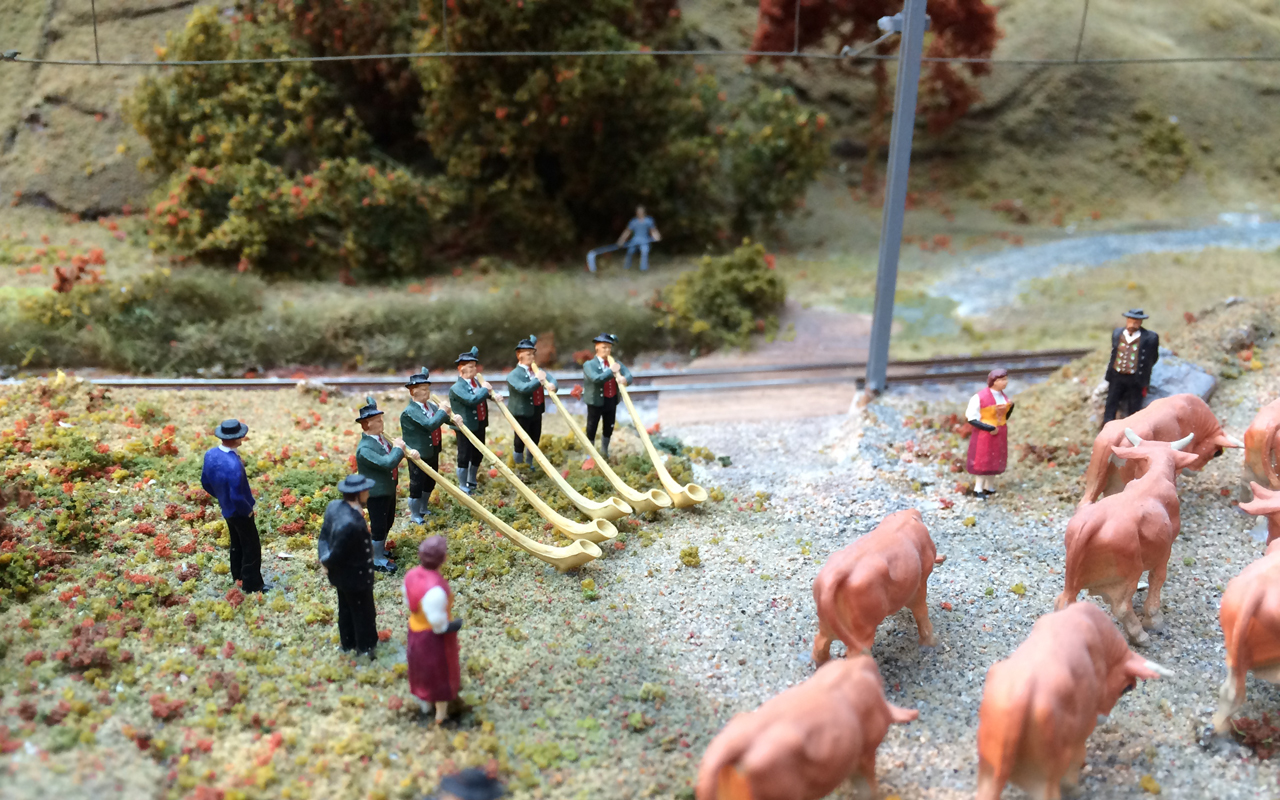
The test piece is not about financial gnomes or international bureaucrats
Challenge and benefit
Add in the usual trademark elements of tonal lyricism, rhythmic pulse, well observed technical challenges and stylistic nuance (there is a ballad and a waltz, solo cameos and clever perc writing) and you have a test-piece that will both challenge and benefit the bands taking to the stage on Saturday morning.
...you have a test-piece that will both challenge and benefit the bands taking to the stage on Saturday morning.
As with the other sections, adjudicator Alan Bourne has written an extensive appraisal of what he and his fellow judges may well be looking out for (he is joined by Mark Wilkinson and Glyn Williams) – and whilst its not a failsafe blueprint for national title success, its sensibilities come from experience.
It's a fine test – challenging in its cleverly constructed, transparent ways, but you sense, musically satisfying to work on and perform.
Fourth Section:
Test Piece: An Elgar Portrait (Dan Price)
Adjudicators: Martin Heartfield; John Maines; Jonathan Pippen
Sunday 19th September
Start: 9.30am
Amington (Alan Gifford) — Midlands
BMP Europe Ltd Goodshaw (David Ashworth) — North West
City of Birmingham (Saphran Ali) — Midlands
Crosskeys Silver (Sion Jones) — Wales
Cwmtawe (Wayne Pedrick) — Wales
Easingwold Town (Alistair Shipman) — North of England
Hemel Hempstead (Paul Fothergill) — London & Southern Counties
Linthwaite (Matthew Pilcher) — Yorkshire
Nailsworth Silver (Anri Adachi) — West of England
Pangbourne & District (Stewart Lewins) — London & Southern Counties
Skelmersdale Prize (Ben Coulson) — North West
Spennymoor Town (Fiona Casewell) — North of England
Tewkesbury Town (Andrea Price) — West of England
Trentham (Shaun Farrington) — Midlands
Immense credit must go to the 14 bands that have made it to Cheltenham this weekend.
The challenges that have come with 18 months or so of performance inactivity will have hit elite level bands hard enough, but it is difficult to imagine what it has been like at the grass roots, where the social aspect of community banding are every bit as important as celebrating contesting success.
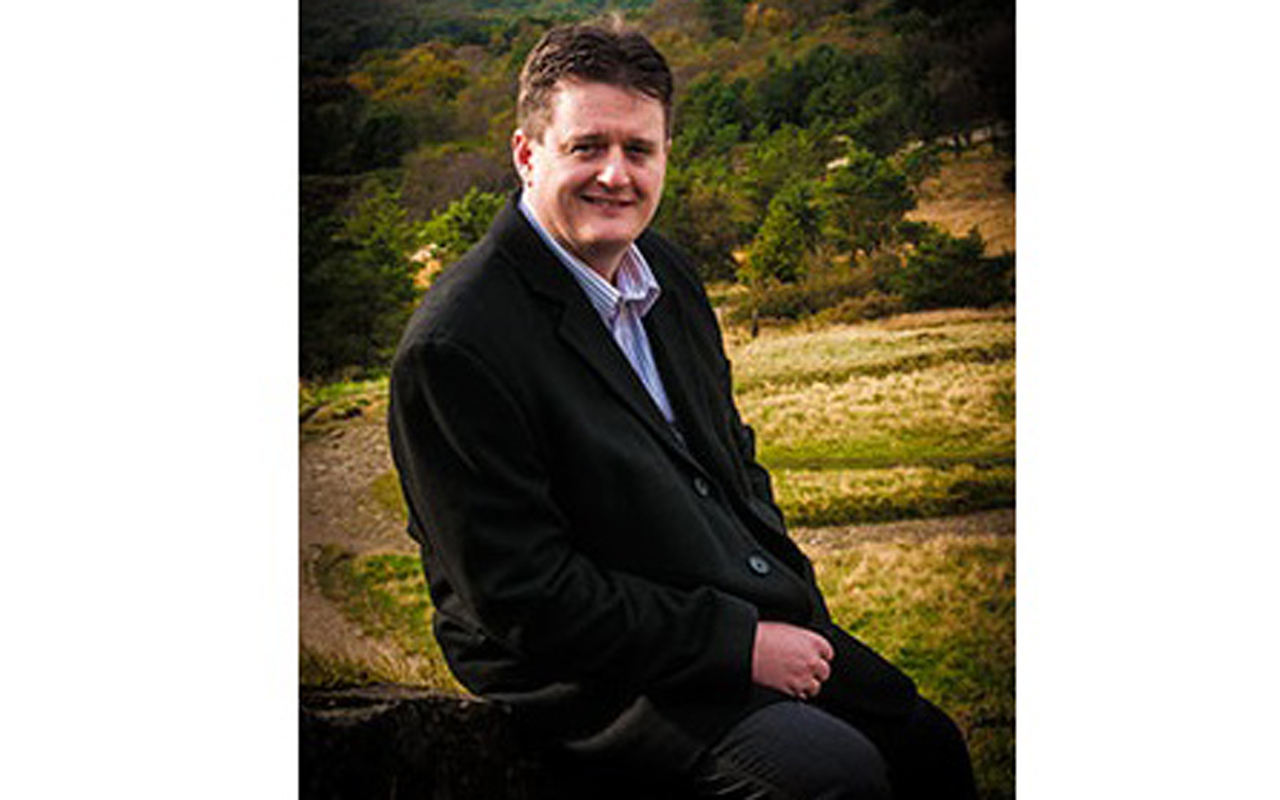
The man behind the portrait - composer Dan Price
Credit too for the choice of test-piece then - one which was written in 2007 to celebrate the 150th anniversary of the birth of composer Edward Elgar.
Facial topiary
Although entitled ‘An Elgar Portrait’, Dan Price’s engaging composition isn’t a character exploration of the man behind the famous moustache – a bit of facial topiary that hid a complex personality.
Instead, it’s more a picture postcard of a trio of landmarks linked to a triptych of works that made his compositional name; Hollybush Hill; Broadhead and Worcester Cathedral; ‘Chanson de Matin’; ‘Nimrod’ from ‘Enigma Variations’ and ‘Pomp and Circumstance No 1’.
Although entitled ‘An Elgar Portrait’, Dan Price’s engaging composition isn’t a character exploration of the man behind the famous moustache – a bit of facial topiary that hid a complex personality.
It’s a neatly scored, well-observed composition (it was a finalist in the 2007 Kirklees Music/Salford University Composition competition) – tweaked slightly for this occasion.
It will have given the bands a challenge – but an enjoyable one you suspect.
Subtle and elegant
‘Introduction – Hollybush Hill’ drifts by on an air of Edwardian grace and favour – Elgar out in his plus fours for a stroll along the peaks of the Malvern Hills.
Nothing too taxing technically (he’s not up the north face of the Eiger), but stylistically it requires subtlety and elegance – the Andante marking allowing progress to be made with a malleable touch or too in compound time all the way to the well-earned rest at the cottage gate.
‘Introduction – Hollybush Hill’ drifts by on an air of Edwardian grace and favour – Elgar out in his plus fours for a stroll along the peaks of the Malvern Hills.
It’s followed by the tender ‘Elegy – Broadhead’ – with its touching nod of appreciation to the composer’s most enigmatic masterpiece. The deceptive simplicity though hides its pitfalls – from the calibrated dynamics to the tricky little interventions (starting with the sop) that add an extra layer of character to the music.
Not Ruritanian
The ‘March – Worcester Cathedral’ closes things with a pinch of well observed pomp and circumstance – not too overblown and Ruritanian, but with just enough sense of Empire and seriousness.
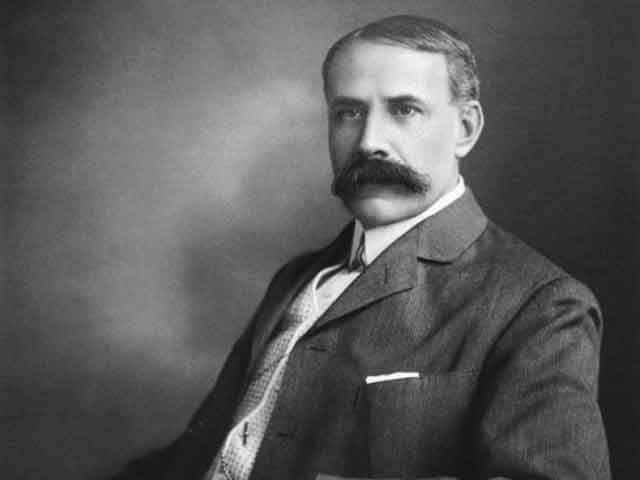
And what a 'tash...
Noblesse Oblige
It’s also marked at crotchet = 95, so it can’t get too bogged down in its own self-importance even with the occasional pull-back and the need to portray a bit of ‘Noblesse Oblige’ to the peasants in the cheap seats (including the banding press) before the final flourish.
This is not an Elgar Portrait painted by Damien Hirst.
Writing his critique on the work in Brass Band World magazine, adjudicator John Maines (who will be joined by Martin Heartfield and Jonathan Pippen) pinpointed all the ‘cultured’ elements that need to be addressed if a band is to catch their ears in the box – and it is well worth taking note of.
This is not an Elgar Portrait painted by Damien Hirst.
That may make it sound simple to master – but much like the basic elements on which the work is based, it is anything but.
Iwan Fox













